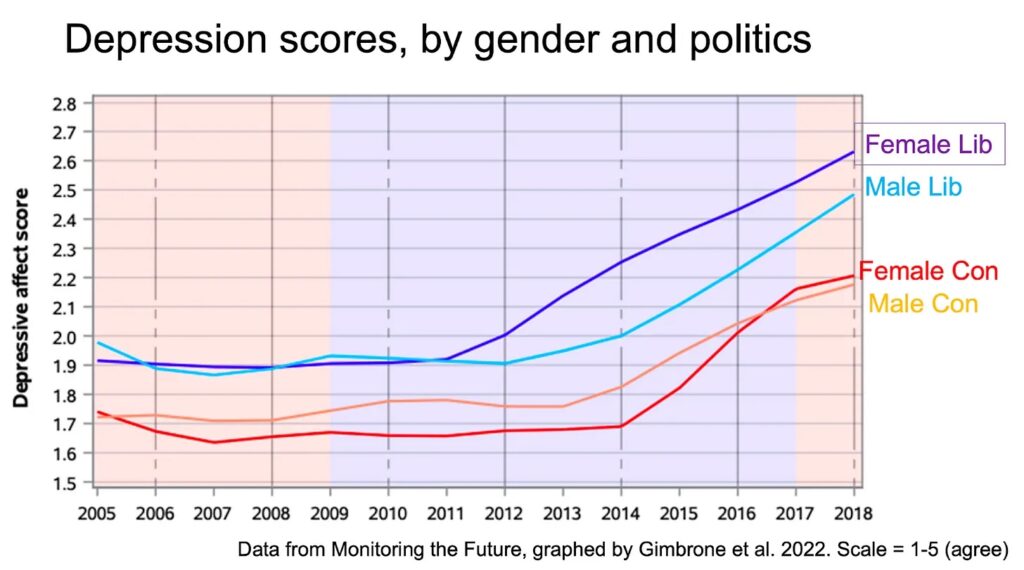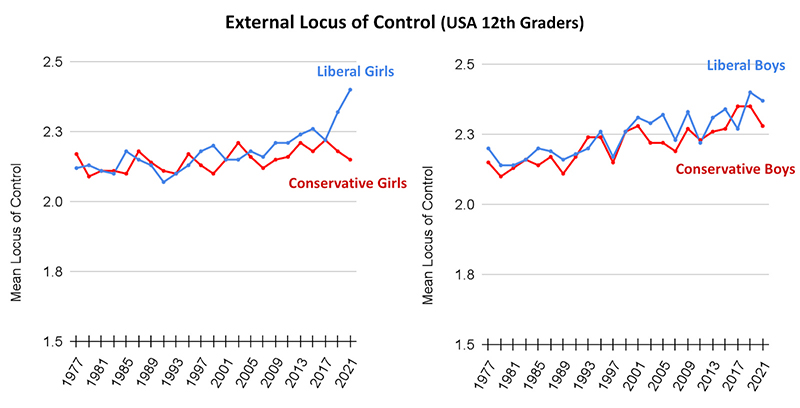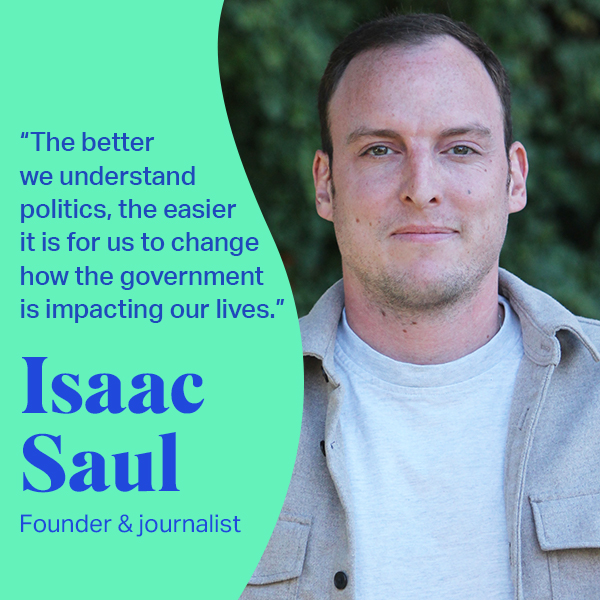Volcanoes are erupting in The Philippines, but on-fire Australia received some welcome rain. The Iran war cries have been called off and The Donald’s military powers are about to be hamstrung by the Senate. Meanwhile, his impeachment trial is starting, and we’re all on Twitter for a front-row seat.
What Could Go Right? Media CBT
A therapy-inspired strategy to help solve Gen Z’s mental health crisis
This is our weekly newsletter, What Could Go Right? Sign up here to receive it in your inbox every Thursday at 6am ET. You can read past issues here.
Longtime readers of this newsletter will know that the introductory text takes a handful of different forms. Mostly it focuses on substantive, underreported progress. Occasionally, it is a constructive take on a difficult and major news story. More rarely, it is thoughts on the underpinning philosophy of The Progress Network (TPN). This week is a philosophy week, but if you are after the usual fare, there is still plenty of good news in the links section below.
Media CBT and Gen Z’s mental health crisis
TPN Member Jonathan Haidt’s piece, “Why the Mental Health of Liberal Girls Sank First and Fastest,” has gotten a lot of attention since it was published on his Substack last week. It’s his latest examination of the data showing that rates of anxiety and depression in young people spiked after 2012, which Haidt pins to the introduction of smartphones and social media. This new piece attempts to explain why, out of all Gen Z groups across gender and political affiliation, liberal girls are the most depressed, and were the first to become so ten years ago. “I think,” Haidt writes, “there’s something about the messages liberal girls consume that is more damaging to mental health” than those consumed by liberal boys, as well as moderate and conservative boys and girls.
Still, however, all of those groups are more anxious and depressed than in previous generations. Haidt posits that something in the cultural air—he calls out the “three great untruths” that words are violence; emotions are reliable guides to reality; and society is comprised of victims and oppressors—has done two things.
First, moved Gen Z’s locus of control from internal to external. This means that instead of feeling a sense of agency, like we are the captains of our own ships, someone with an external locus of control feels that “strong forces or agents outside of themselves will determine what happens to them.” Second, led to a sharp rise in self-derogatory beliefs like I feel I can’t do anything right and I do not have much to be proud of.


Haidt may be right or wrong that there is something in the zeitgeist, particularly in the liberal social media one, that is causing what he calls “reverse CBT.” Here he is referring to cognitive behavioral therapy, a common therapy technique that teaches how to rework thought patterns to stop “cognitive distortions” such as catastrophizing and black-and-white thinking. Instead, he says, Gen Z is learning to emphasize such cognitive distortions.
If Haidt’s theory is right, however, it suggests that we can reverse the “reverse CBT” by finding strategies for rewriting the “captain of your own ship” narrative for Gen Z and subsequent generations. In this framework, I see TPN’s focus on what is going right, and pointing out where progress is being made, especially as the result of human endeavor, as a media CBT of sorts. Its effects are backed up by the regular notes we receive from readers who tell us that TPN’s content has improved their mental health. (We love receiving those notes, by the way.)
Another way to put it, borrowing from Shadi Hamid’s exploration in The Atlantic of whether it’s wisest simply to not engage with the news, is that TPN offers a path to consume the news without catastrophizing it. That’s what the people want, it seems. A new report from More in Common and the American Press Institute found that while 87 percent of Americans value “spotlighting problems in order to solve them,” 88 percent of them also want to “celebrate what’s right” in order to make society stronger.
You’re with us already, so I know I’m preaching to the choir about what TPN is trying to do. But I would like to emphasize once more, as I have many times in the past, that we don’t have to wait for a media transformation away from scaremongering to start believing that we have agency over where society goes—that we are indeed the captains of our own ships.
Engaging with the news with a constructive eye is a technique that can be learned, and, once internalized through exposure and repetition, can become a general mindset for understanding the world at large. That technique involves taking the long view, understanding how journalists use (and sometimes misuse) numbers, noticing when something is hard news and when it’s opinion and punditry, knowing that what journalism covers is not an accurate representation of daily life, and keeping in mind that much of what we see in the news, and our subsequent reactions to it, are speculative.
“Media CBT” is definitely not enough to solve the mental health problems Gen Z is facing. It’s just one facet of a multi-faceted issue, and progress will likely be a trickle if media and politics don’t give up their current toxic relationship. Whatever is in the air needs to be understood and confronted from all sides. For his part, Haidt suggests policy recommendations around youth use of the Internet, and Clay Routledge has some ideas around parenting to prevent hyper-sensitization here.
There’s already a lot of societal interest in this problem, but the energy around it mostly manifests as parental panic and political finger-pointing. We can each find our own ways to direct it somewhere more productive.
Before we go
Three pieces of state-based news: One, after reporting on this as progress, we’re disappointed to see Maryland backing out of the four-day workweek pilot proposal. The plan was to incentivize companies with tax credits. Two, the Texas Senate has passed a gun safety measure that would prevent a gun being sold to anyone who had been involuntarily hospitalized for mental illness between the ages of 16 and 18. Three, South Dakota is trying the harm reduction strategy of legalizing fentanyl test strips, which help prevent accidental consumption of fentanyl. Only Ohio and Alaska currently allow fentanyl test strips to be sold, as they fall under states’ drug paraphernalia laws.
And this is for the dark humor of it all. In the US we have partisan squabbling over how much and what to give to Ukraine’s war effort. In Latvia, they have decided to donate drunk drivers’ cars, which were piling up in impound lots.
Below in the links section, phone-charging is going green, period taxes might be getting the boot, Australian women are racking up union wins, and more.

South Korea is planning to build the world’s largest spokeless Ferris wheel in its capital city by the end of 2027. The 180-meter (591-foot) “Seoul Ring” will run on renewable energy and be built on a former landfill that is now used for eco-friendly projects.
Over-diagnosing democratic decline

With the number of populist leaders down to a 20-year low, and much of what has been called “democratic backsliding” corrected through the electoral process, are reports of democracy’s decline exaggerated? | Read more
Bootstrapping the American Dream | S4 E5

Has the American Dream changed? Is a side hustle the answer to income inequality? And is self-reliance the all-important north star we have been led to believe it is? Today, author, journalist, and Executive Director of the Economic Hardship Reporting Project, Alissa Quart, asserts that at the heart of our distress is a misplaced belief in our independence and the conviction that we must rely on ourselves alone. Plus, a look at women’s rights worldwide and a rise in guaranteed paid paternity leave. | Listen to the episode
Progress, Please
(Found good news? Tweet at us @progressntwrk or email.)
Other good stuff in the news 📱
Energy & Environment:
- Clean energy to make up 84% of new US power capacity in 2023 | Canary Media
- The end of climate science: A new field of study is being born | Heatmap News
- An ‘unsexy’ system for greening fashion that actually works | Reasons to Be Cheerful
- New idea for sucking up CO2 from air shows promise | BBC
- The scientific breakthrough that could make batteries last longer | The Wall Street Journal
- Insecticide regulations have worked, researchers say | Grist
Science & Tech:
- The iPhone is staging a quiet revolution in how we charge our devices | The Washington Post
- World’s largest 3D-printed affordable housing project launches in Kenya | Freethink
- Airports get new tech to prevent off-runway landings | Axios
Politics & Policy:
- Momentum builds to ban ‘period taxes’ | Axios
- EPA proposes stricter limits on coal plant water pollution | AP
- Campaigners hail law raising age of marriage to 18 in England and Wales | The Guardian
- Illinois enacts mandatory paid leave ‘for any reason’ | AP
- Honduras lifts decade-long ban on ‘morning after pill’ | Reuters
Public Health:
- Indoor air is full of flu and Covid viruses. Will countries clean it up? | Nature
- Tirzepatide: A novel obesity drug ushers in a new era of weight loss—because this one works | Big Think
- Study of trans men suggests that androgen hormone therapy can lower breast cancer risk | Stat News
- British Columbia will make contraception free—a first in Canada | CBC News
- Covid’s effect on mental health not as great as first thought, study suggests | The Guardian
Society & Culture:
- McClellan becomes 1st Black woman for Virginia in Congress | AP
- Fighting for gender equality: How far we’ve come and how far we have left to go | Forbes
- Fathers gained family time in the pandemic. Many don’t want to give it back. | The New York Times
- If we want more babies, our ‘profoundly anti-family’ system needs an overhaul | The New York Times
Economy:
- Australian unions celebrate 10 wins for women on International Women’s Day | ACTU
- Women’s labor participation returns to pre-Covid levels in US | Bloomberg
- The US economy added 311,000 jobs in February, outpacing expectations | CNN
TPN Member originals 🧠
(Who are our Members? Get to know them.)
- The SVB bank failure, explained | Isaac Saul
- Can the SVB crisis be solved in the longer run? | Tyler Cowen
- Why racial discussions should also focus on progress | John McWhorter
- Don’t overthink poverty in the United States | Matthew Yglesias
- An antidote to despair | Emma Varvaloucas
- Love America by making it better | Theodore R. Johnson
- The Age of AI vs. the Age of Populism | James Pethokoukis
- Advantage Mexico | Ian Bremmer
- Can we put an end to America’s most dangerous myth? | Alissa Quart
- The self-destructive effects of progressive sadness | David Brooks
- Primatologist Frans de Waal on chimpanzee—and human—politics | Yascha Mounk
- The emissions of the attention economy | Scott Galloway
- The UK now ranks as one of the most socially liberal countries in Europe | Bobby Duffy
- Does Joe Biden mean what he says on industrial policy? | Matthew Yglesias
- Poet Ada Limón: ‘To be made whole’ | Krista Tippett
- Putin and Netanyahu show why bad things happen to bad leaders | Thomas L. Friedman
- What we can do to stop authoritarian brutes | Ruth Ben-Ghiat
- Professor Yasheng Huang on the development of the Chinese state | Tyler Cowen
Department of Ideas 💡
(A staff recommendation guaranteed to give your brain some food for thought.)
10 Ways to Avoid Being Fooled | The Prism
Mental models for discerning truth
Why we picked it: I find that I’m repeating myself with all the “seeking truth” and “thinking better” articles. But what can I say? That’s my jam. It’s what interests me most and what I think we as individuals and a society need to improve upon the most. —Brian Leli
New Member Alert

Isaac Saul is a politics reporter and the founder of Tangle, an independent, subscriber-supported, non-partisan politics newsletter that summarizes the best arguments from the left and right on the news of the day. Tangle has been recognized by The New York Times, Forbes, The Hustle, Substack and many others as one of the most successful politics newsletters on the internet.
Until Next Time
So you should google the country before holding the official ceremony to become a “sister city” with it? Got it. 🤦


